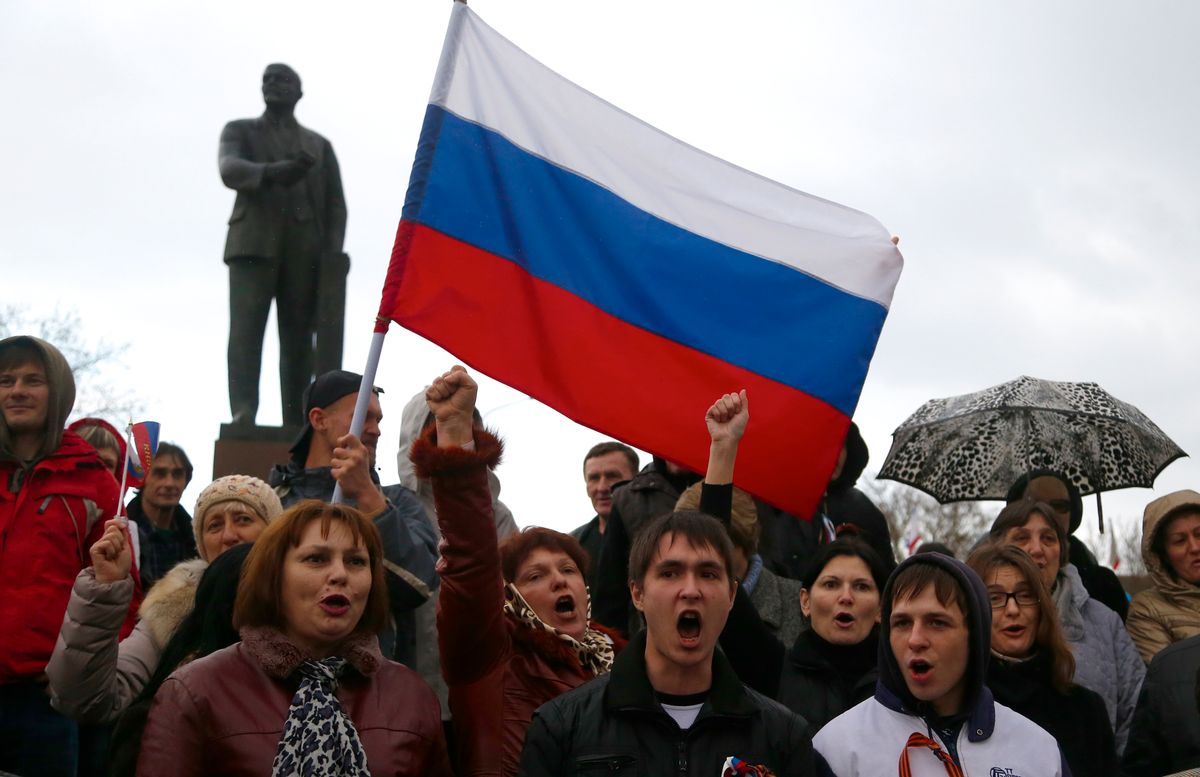WASHINGTON (AP) — President Barack Obama declared on Thursday that a referendum in 10 days on the future of a Ukraine's Crimea peninsula would violate international law. The United States also moved to impose visa restrictions and financial sanctions on Russians and Ukrainians for the moves Moscow already has made into Crimea.
Speaking from the White House, Obama said any decisions on the future of Crimea, a pro-Russian area of Ukraine, must include the country's new government.
"The proposed referendum on the future of Crimea would violate the constitution and violate international law," Obama said. "We are well beyond the days when borders can be redrawn over the heads of democratic leaders."
Obama spoke hours after a March 16 date was set for a referendum on whether the region should become part of Russia.
Russian forces began moving into Crimea about a week ago, despite Obama's warnings that there would be costs for such actions. Seeking to follow through on that threat, Obama moved Thursday to enact new visa restrictions on an unspecified and unidentified number of people and entities that the U.S. accused of threatening Ukraine's sovereignty and territorial borders. The restrictions were unlikely to directly target Russian President Vladimir Putin.
Obama also signed an executive order that will allow the U.S. to levy financial sanctions. In a statement, the White House said the penalties would target "those who are most directly involved in destabilizing Ukraine, including the military intervention in Crimea, and does not preclude further steps should the situation deteriorate."
In Brussels, meanwhile, the European Union announced it was suspending talks with Russia on an economic pact and on a visa deal in response to the Russian intervention in Crimea. EU leaders, like Obama, threatened further sanctions if Russia pushes ahead.
"I am confident that we are moving forward together, united in our determination to oppose actions that violate international law and to support the government and people of Ukraine," Obama said.
Senior Obama administration officials said penalties will deepen significantly if Russia presses into areas of eastern Ukraine, though they said there is currently no indication Moscow has taken that step. The officials also indicated that the penalties could be ratcheted down if Russia pulls back its troops in Crimea and recognizes Ukraine's new government.
"We call on Russia to take the opportunity before it to resolve this crisis through direct and immediate dialogue with the government of Ukraine," the White House statement read.
Ukraine's unrest peaked in February, after months of pro-Western protests seeking the overthrow of President Viktor Yanukovych in anger over economic woes and corruption. Yanukovych, who is pro-Russian, fled for protection to a location just outside of Moscow, and Putin sent troops into Crimea in a show of force against the upstart government in Kiev.
Crimea is a peninsula that hosts a major Russian navy base and is historically and culturally a Russian stronghold.
The visa bans will be imposed immediately and come in addition to an earlier State Department decision to deny U.S. entry to those involved in human rights abuses related to political oppression in Ukraine. Officials would not say whether Yanukovych was a target of the visa ban or the sanctions.
The sanctions plan, outlined in an executive order, lays the legal groundwork for the Treasury Department to impose financial penalties on offenders. The aim is clearly to punish the separatist movement in Crimea as well as Russia for its decision to send military forces there.
Specifically, the sanctions would target people who undermine Ukraine's democracy and new government; threaten the country's peace, security, stability and sovereignty; are linked to misappropriations of government assets; and try to assert governmental authority over any part of Ukraine without the consent of Kiev. They would also prohibit U.S. persons from doing business with those who have been sanctioned.
Congress has been rushing to impose hard-hitting sanctions on Russia in response to its takeover of Crimea, hoping Europe will follow the lead of the United States in upping the pressure on Putin's government.
The U.S. sanctions push represents a rare case of broad agreement among the Obama administration and Democrats and Republicans in both houses of Congress. But they all are also united in their concern that American economic penalties will mean little without the participation of European countries with far deeper commercial relations with Russia.
Brendan Buck, a spokesman for House Speaker John Boehner, welcomed the sanctions and said the Ohio Republican is "committed to working with the administration to give President Obama as many tools as needed to put President Putin in check as well as prevent Russia from infringing on the sovereignty of any of its other neighbors."
Rep. Adam Schiff, a California Democrat, called the new penalties "a positive first step" that needs to be coupled with similar sanctions from Europe to underscore the costs — diplomatic and economic — of rejecting Ukraine's sovereignty.
"I hope that Russia can be dissuaded from further aggression and can be walked back from its perilous course," Schiff said. "But if not, the U.S. and its allies must be prepared to use all of the diplomatic and economic tools at its disposal to deter such reckless conduct."



Shares